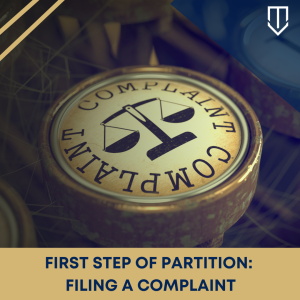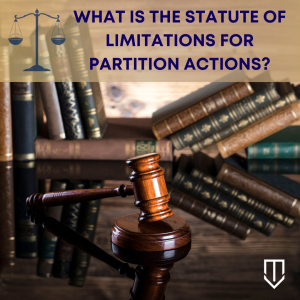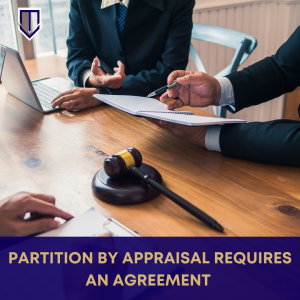 When there are two or more owners of a piece of real property who are unable to come to an agreement on how to divide the property, any co-owner of the subject property may petition the court to partition the property. This is known as a partition action. Generally, the decision of a court to partition the property is merely the first step in the partition process. Although a partition action may sound quite simple, it is a complex process that requires extensive accounting and patience.
When there are two or more owners of a piece of real property who are unable to come to an agreement on how to divide the property, any co-owner of the subject property may petition the court to partition the property. This is known as a partition action. Generally, the decision of a court to partition the property is merely the first step in the partition process. Although a partition action may sound quite simple, it is a complex process that requires extensive accounting and patience.
What is a Partition Action?
A partition action is an action brought by a co-owner of a piece of real property against another co-owner, seeking to divide the property according to the respective interests of the co-owners. In order to establish a right to a partition, a party must show that they have some ownership interest in the subject property. Under Code of Civil Procedure section 872.210, any owner of an estate of inheritance, an estate for life, or an estate for years in real property where such property or estate is owned by several persons concurrently or in successive estates may bring a partition action. (CCP § 872.210.) Therefore, a co-tenant has an absolute right to partition. (Formosa Corp. v. Rogers (1951), 108 Cal.App.2d 397.) At Underwood Law Firm, our attorneys are more than familiar with partition actions and the step-by-step process of pursuing a partition.
 California Partition Law Blog
California Partition Law Blog


 In California, property subject to a trust can be partitioned, though with some additional wrinkles to the regular partition process. Because trusts can often involve successive estates with future and present property interests, litigants should take care to understand the law regarding trusts before beginning such an action.
In California, property subject to a trust can be partitioned, though with some additional wrinkles to the regular partition process. Because trusts can often involve successive estates with future and present property interests, litigants should take care to understand the law regarding trusts before beginning such an action.  Co-ownership of property brings with it many rights and duties under the law. These rights and duties can vary depending on whether co-owners hold property as
Co-ownership of property brings with it many rights and duties under the law. These rights and duties can vary depending on whether co-owners hold property as  Slander of title is quite the unique cause of action. As the name implies, it involves defamatory or slanderous activity but not against any person or personal interest. Instead, a slander of title involves activity that calls the state of your title into doubt (by, for example, filing an unwarranted lis pendens) that diminishes the value of your property.
Slander of title is quite the unique cause of action. As the name implies, it involves defamatory or slanderous activity but not against any person or personal interest. Instead, a slander of title involves activity that calls the state of your title into doubt (by, for example, filing an unwarranted lis pendens) that diminishes the value of your property.  In most cases, no. Instead, the statute of limitations most frequently bars a partition action when a party’s rights to the property have lapsed due to an ouster.
In most cases, no. Instead, the statute of limitations most frequently bars a partition action when a party’s rights to the property have lapsed due to an ouster.  A partition by appraisal is an alternative method of partition that occurs when the parties to a
A partition by appraisal is an alternative method of partition that occurs when the parties to a  “Joint tenancy” is a phrase that most people associate with the co-ownership of a property. And indeed, this is correct. Joint tenancy is a form of co-ownership in California, second only to
“Joint tenancy” is a phrase that most people associate with the co-ownership of a property. And indeed, this is correct. Joint tenancy is a form of co-ownership in California, second only to In California, in many
In California, in many  Even when a party finally secures a judgment of partition, the property itself must still be sold (or partitioned in another way). This raises a brand-new set of issues for litigants as they attempt to figure out the terms of sale, when the property should be sold, and, most importantly, the asking price.
Even when a party finally secures a judgment of partition, the property itself must still be sold (or partitioned in another way). This raises a brand-new set of issues for litigants as they attempt to figure out the terms of sale, when the property should be sold, and, most importantly, the asking price. The appointment of a partition referee is one of the most important aspects of a
The appointment of a partition referee is one of the most important aspects of a